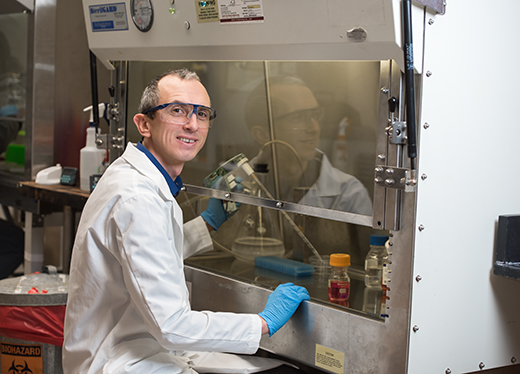K-State researcher to explore increasing effectiveness, reducing toxicity of chemo for cervical cancer
Friday, Sept. 8, 2023

Nicholas Wallace, K-State biologist and cancer researcher, has received an NIH grant that he will use to explore ways to make chemotherapy more effective and less toxic for cervical cancer patients. | Download this photo.
MANHATTAN — According to the World Health Organization, cervical cancer is the fourth most common cancer among women worldwide. A Kansas State University biologist is researching methods to make cervical cancer cells more sensitive to chemotherapy and reduce the toxicity of treatments for patients.
Nicholas Wallace, associate professor in the Division of Biology, studies human papillomavirus, or HPV, a common virus that causes almost all cervical cancer. He has received an R21 Exploratory/Developmental Research Grant Award from the National Institutes of Health to understand how HPV turns normal cells into deadly cancer cells.
"By understanding how these viruses cause cancer, we hope to identify weaknesses in tumors caused by HPV," Wallace said. "Ideally, these weaknesses could be exploited to reduce the side effects from chemo."
While chemotherapy can be used to treat cervical cancer, the harsh side effects can prevent doctors from giving patients enough of the treatment to kill the cancer in their bodies.
Chemo drugs often work by damaging DNA, and if cancer cells cannot repair that damage, they die. The Wallace lab found that cervical cancer uses a process called microhomology-mediated end joining, or MMEJ, to repair DNA. Normal cells fix DNA damage in other ways.
The Wallace lab plans to make cervical cancer cells more sensitive to chemo by blocking MMEJ. Since normal cells do not rely on MMEJ, they should not be affected.
"The goal is to make using less chemo effective, leading to fewer side effects and a better quality of life for people fighting cervical cancer. We are trying to make chemo work without causing so much suffering," Wallace said.
Wallace is a member of the Johnson Cancer Research Center at Kansas State University, which supported the lab's efforts before it received federal funding.
"Honestly, without the cancer center's help, we would never have been able to start this project or make these discoveries," Wallace said.
The Johnson Cancer Research Center in the College of Arts and Sciences at K-State supports and advances cancer research and education with competitive award programs funded through private donations.
